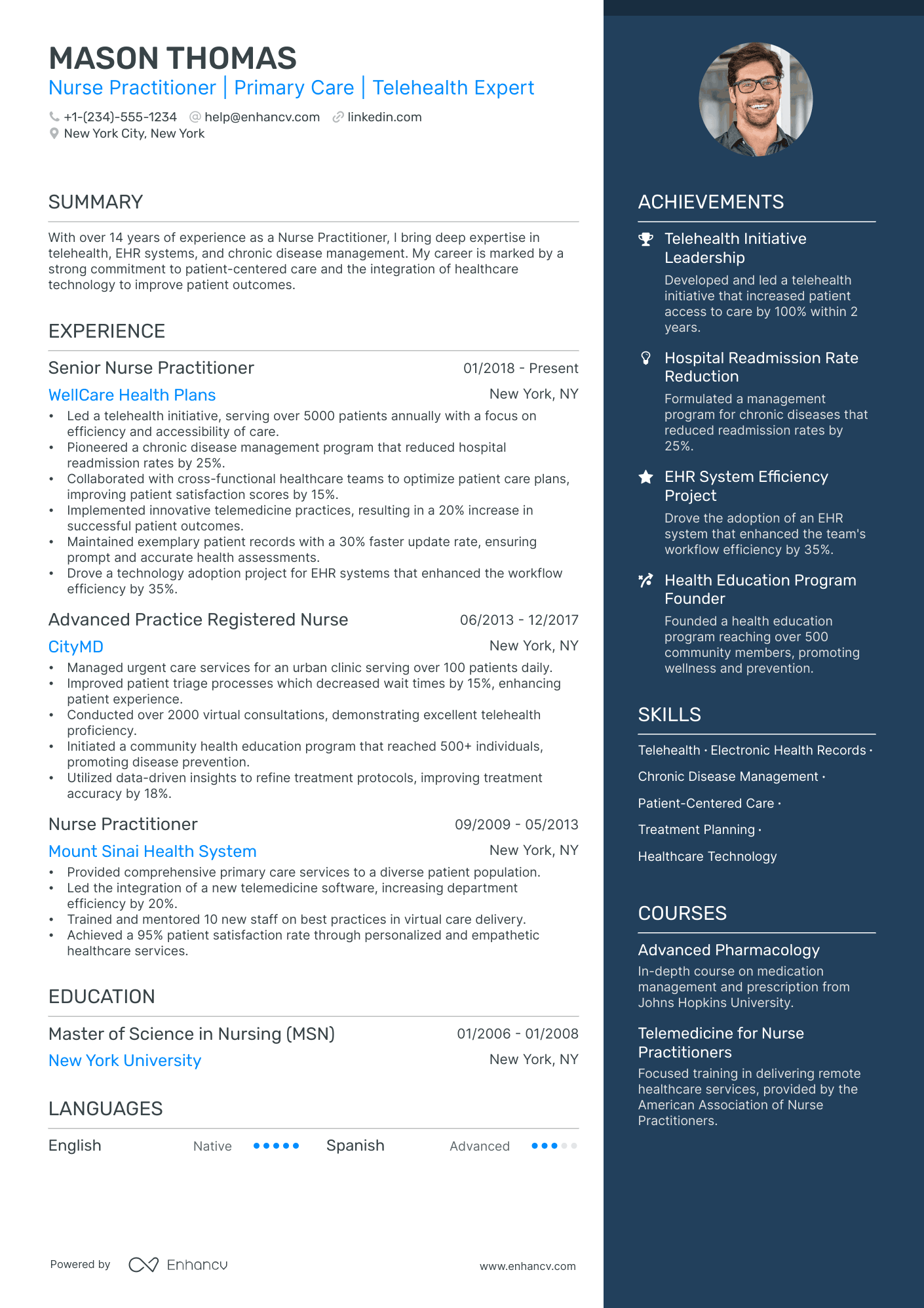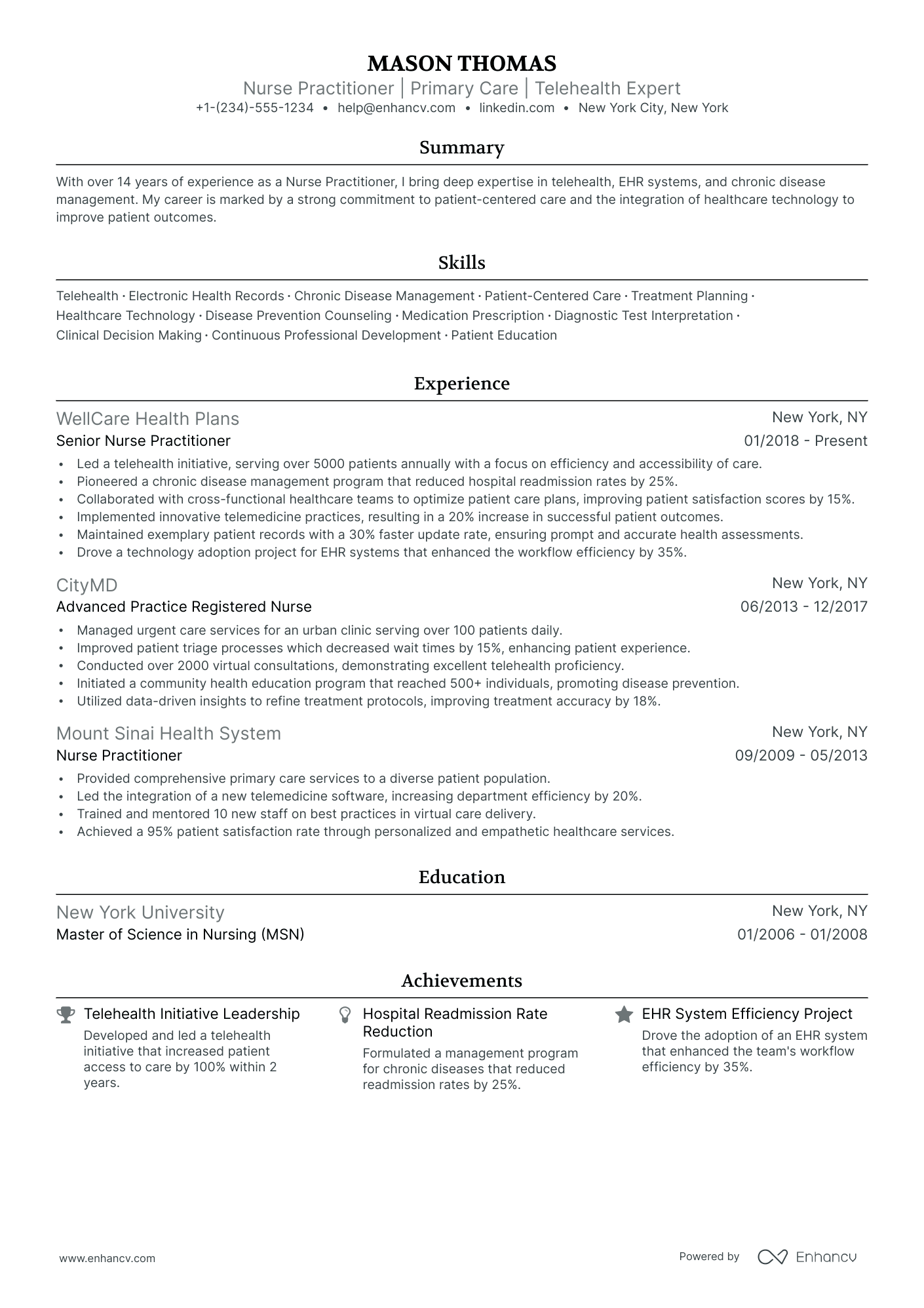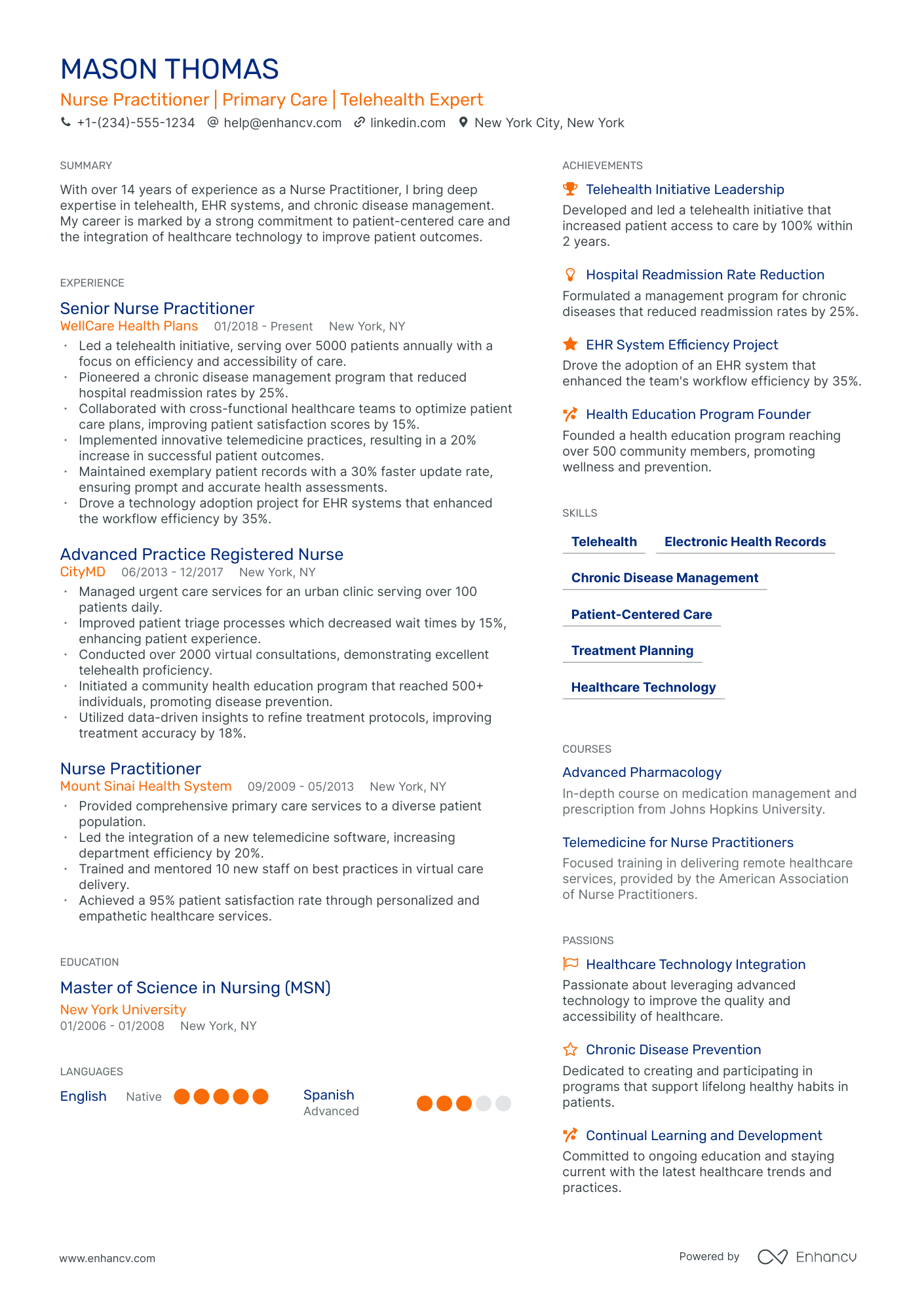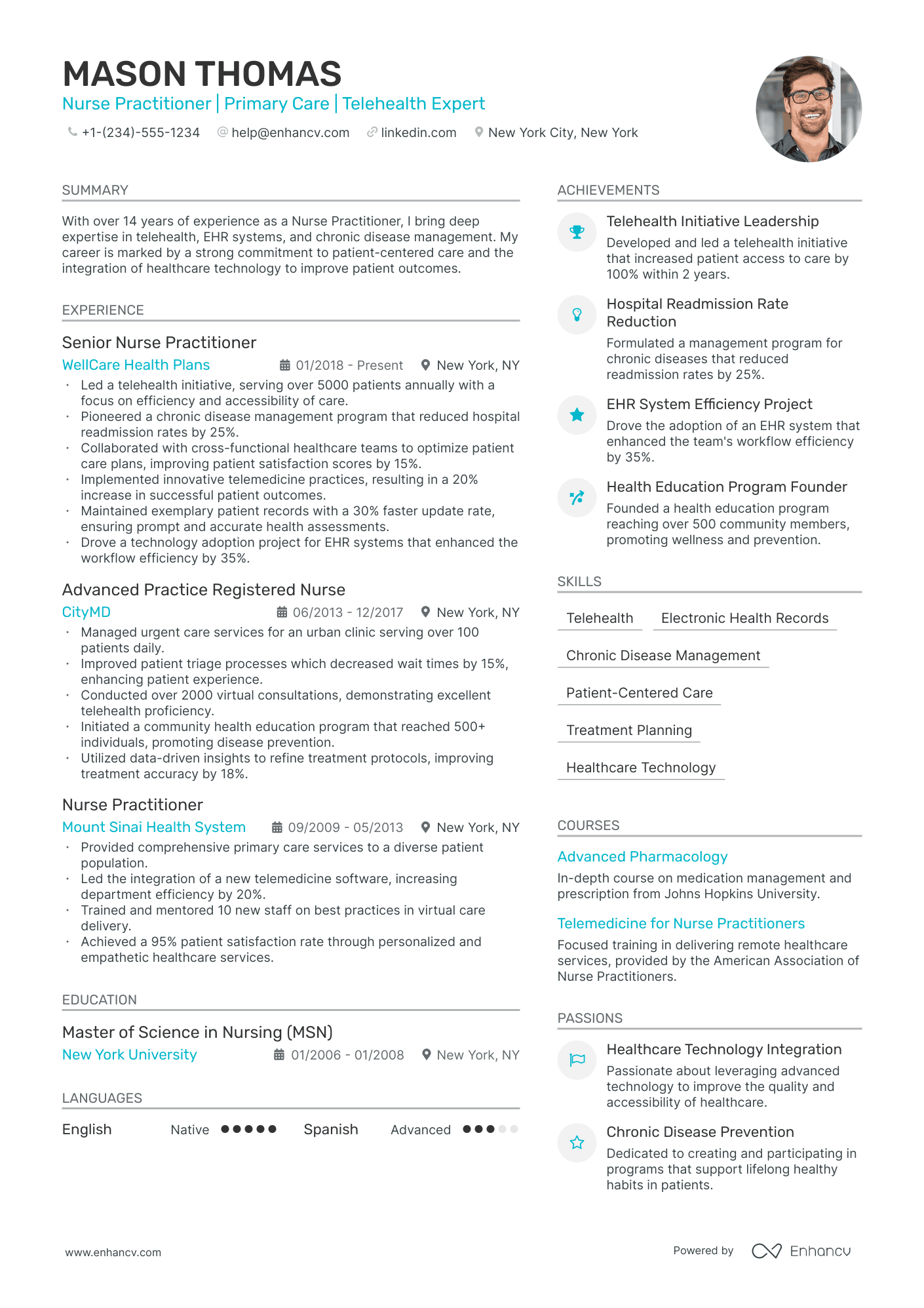As a nurse practitioner, effectively showcasing your clinical experience and specialized skills in a concise manner on a resume can be quite challenging. Our guide provides clear, step-by-step advice to help you highlight your expertise and tailor your resume to stand out in the competitive healthcare job market.
- Get inspired from our nurse practitioner resume samples with industry-leading skills, certifications, and more.
- Show how you can impact the organization with your resume summary and experience.
- Introducing your unique nurse practitioner expertise with a focus on tangible results and achievements.
If the nurse practitioner resume isn't the right one for you, take a look at other related guides we have:
Enhancing your nurse practitioner resume: format and layout tips
"Less is more" - this principle is key for your nurse practitioner resume design. It emphasizes the importance of focusing on why you're the ideal candidate. Simultaneously, it's crucial to select a resume design that is both clear and simple, ensuring your qualifications are easily readable.Four popular formatting rules (and an additional tip) are here to optimize your nurse practitioner resume:
- Listing experience in reverse chronological order - start with your most recent job experiences. This layout helps recruiters see your career progression and emphasizes your most relevant roles.
- Including contact details in the header - make sure your contact information is easily accessible at the top of your resume. In the header, you might also include a professional photo.
- Aligning your expertise with the job requirements - this involves adding essential sections such as experience, skills, and education that match the job you're applying for.
- Curating your expertise on a single page - if your experience spans over a decade, a two-page resume is also acceptable.
Bonus tip: Ensure your nurse practitioner resume is in PDF format when submitting. This format maintains the integrity of images, icons, and layout, making your resume easier to share.
Finally, concerning your resume format and the Applicant Tracker System (ATS):
- Use simple yet modern fonts like Rubik, Lato, Montserrat, etc.
- All serif and sans-serif fonts are friendly to ATS systems. Avoid script fonts that look like handwriting, however.
- Fonts such as Ariel and Times New Roman are suitable, though commonly used.
- Both single and double-column resumes can perform well with the ATS.
Upload & Check Your Resume
Drop your resume here or choose a file. PDF & DOCX only. Max 2MB file size.
PRO TIP
Mention specific courses or projects that are pertinent to the job you're applying for.
Ensure your nurse practitioner resume stands out with these mandatory sections:
- Header - the section recruiters look to find your contact details, portfolio, and potentially, your current role
- Summary or objective - where your achievements could meet your career goals
- Experience - showcasing you have the technical (and personal) know-how for the role
- Skills - further highlighting capabilities that matter most to the nurse practitioner advert and your application
- Certifications/Education - staying up-to-date with industry trends
What recruiters want to see on your resume:
- Clinical experience and specialty areas - highlighting experience in specific healthcare settings or with particular patient populations.
- Education and certifications - showcasing advanced degrees, special certifications like FNP (Family nurse practitioner) or PMHNP (Psychiatric-Mental Health nurse practitioner), and additional relevant training.
- Scope of practice - detailing experience with procedures, diagnostics, and treatment planning within the full scope of licensure as a nurse practitioner.
- Prescriptive authority and DEA registration - indicating the ability to prescribe medication and manage patient medication plans if applicable.
- Interprofessional collaboration and leadership skills - emphasizing experience working in teams, leading initiatives, or managing other healthcare staff.
Defining your professional expertise in your nurse practitioner resume work experience section
The work experience section, often the most detailed part of your resume, is where you discuss your past roles and achievements. To effectively list your experience, consider these four key tips:
- Align your expertise with the job requirements. It's vital to integrate keywords matching the job criteria to pass initial assessments;
- Show, don’t just tell. Quantify your responsibilities by stating your actual achievements in previous roles;
- Include measurable metrics. For instance, how did your performance impact the annual ROI?
- Highlight crucial industry skills. Mention both technological knowledge and interpersonal skills in this section.
These guidelines will help you craft an impressive nurse practitioner resume work experience section that is bound to catch recruiters' attention.
- Managed a patient caseload of approximately 30 patients per week, providing comprehensive health assessments, diagnoses, and treatment plans for a diverse population.
- Led a quality improvement project for diabetes care that improved patient HbA1c control rates by 25% within a 1-year period through the implementation of new protocols.
- Spearheaded the integration of electronic health records within the clinic, enhancing patient care coordination and tracking outcomes more efficiently.
- Developed and executed a community outreach program servicing over 500 individuals, improving access to primary care services in underserved areas by 30%.
- Served as a key team member in the Cardiology department, helping to reduce patient readmission rates by 15% through targeted patient education and follow-up programs.
- Mentored and trained four nurse practitioner students, fostering a learning environment and enhancing the skill set of upcoming practitioners.
- Performed minor surgical procedures, which reduced the need for external referrals by 20%, increasing the clinic's capacity to retain a wider scope of services.
- Successfully led a vaccination drive that resulted in a 40% increase in flu vaccinations in the first year among at-risk populations.
- Delivered culturally competent care as part of a bilingual English/Spanish clinic, enhancing patient satisfaction scores by 35% due to improved communication.
- Oversaw the successful expansion of the clinic's telehealth services, which allowed for a 50% increase in patient consultations during the COVID-19 pandemic.
- Collaborated with multidisciplinary teams to formulate advanced pain management techniques, reducing the average patient pain score by 60% post-treatment.
- Initiated a comprehensive medication review process reducing medication errors by 40% and enhancing patient safety.
- Acted as a primary care provider for over 45 geriatric patients per week, optimizing treatment plans and proactively addressing complex chronic conditions.
- Implemented a falls prevention program that resulted in a 30% reduction in patient falls within the facility over a 2-year span.
- Authored and published three articles in peer-reviewed journals on topics related to elderly care and nurse practitioner roles in geriatric medicine.
- Led an initiative to integrate mental health assessments into routine patient evaluations, leading to a 20% increase in early detection of mental health conditions.
- Established a pilot program for the management of opioid dependency, contributing to a 45% success rate in patient recovery and sobriety maintenance.
- Authored a successful grant application securing $100,000 in federal funds to expand addiction services at the clinic.
- Orchestrated the launch of a nurse-led clinic initiative that improved patient access to care and increased annual patient volume by 10%.
- Drove the adoption of a patient-centered medical home model, which enhanced care coordination and patient engagement, leading to a 90% patient satisfaction rating.
- Coordinated clinical trials for new asthma treatments, contributing to the successful FDA approval of a novel inhaler device.
- Championed a holistic approach to women’s health, integrating nutrition and fitness counseling into patient care plans, boosting overall wellness metrics by 25% among the patient cohort.
- Led a research project on the effects of prenatal care on maternal and infant health outcomes, influencing clinic policy to incorporate findings into practice.
- Acted as the lead nurse practitioner in a multidisciplinary team that reduced average labor induction times by 15% through the introduction of new protocols.
Quantifying impact on your resume
- Include the number of patients you see on average per day to demonstrate your efficiency and ability to handle a significant workload.
- List the percentage of patient satisfaction increase during your tenure to showcase your commitment to patient care and service quality.
- Mention the specific reduction in wait times due to process improvements you implemented, indicating your problem-solving skills and focus on efficiency.
- Detail the amount of revenue you generated or saved for the practice through cost-effective care or new treatment offerings, reflecting your financial acumen.
- Quantify your experience with the number of years spent in specialty areas to emphasize your expertise in particular fields of healthcare.
- Specify the number of successful patient outcomes or reduced readmission rates you influenced to highlight your effectiveness as a care provider.
- Include the size of the teams you've managed or trained, if applicable, to present your leadership capabilities and management experience.
- Provide figures on your continuing education, such as the number of hours or credits earned, to show your dedication to professional development and staying current.
Action verbs for your nurse practitioner resume
Nurse practitioner resume without experience: a walk-through guide
If you don't happen to have any relevant experience yet, you can substitute this with:
- Short-term gigs and stunts - like month-long internships, that you have done during your university days
- Contract work - be specific about the relevance and outcomes of each role you include
- Resume format that prioritizes your skills - the functional-skill-based format or hybrid format could work
- Research roles - feature those especially prominently if you've participated in a noteworthy project or your role was of utmost importance to the project's success.
Recommended reads:
PRO TIP
If you failed to obtain one of the certificates, as listed in the requirements, but decide to include it on your resume, make sure to include a note somewhere that you have the "relevant training, but are planning to re-take the exams". Support this statement with the actual date you're planning to be re-examined. Always be honest on your resume.
In-demand hard skills and soft skills for your nurse practitioner resume
A vital element for any nurse practitioner resume is the presentation of your skill set.
Recruiters always take the time to assess your:
- Technological proficiency or hard skills - which software and technologies can you use and at what level?
- People/personal or soft skills - how apt are you at communicating your ideas across effectively? Are you resilient to change?
The ideal candidate presents the perfect balance of hard skills and soft skills all through the resume, but more particular within a dedicated skills section.
Building your nurse practitioner skills section, you should:
- List up to six skills that answer the requirements and are unique to your expertise.
- Include a soft skill (or two) that defines you as a person and professional - perhaps looking back on feedback you've received from previous managers, etc.
- Create up to two skills sections that are organized based on the types of skills you list (e.g. "technical skills", "soft skills", "nurse practitioner skills", etc.).
- If you happen to have technical certifications that are vital to the industry and really impressive, include their names within your skills section.
At times, it really is frustrating to think back on all the skills you possess and discover the best way to communicate them across.
We understand this challenge - that's why we've prepared two lists (of hard skills and soft skills) to help you build your next resume, quicker and more efficiently:
Top skills for your nurse practitioner resume:
Electronic Health Records (EHR) systems
Patient assessment tools
Diagnostic imaging technologies
Telehealth platforms
Pharmacology knowledge
Clinical decision support systems
Medical coding and billing software
Laboratory information systems
Vital signs monitoring equipment
Suturing and wound care tools
Communication skills
Empathy
Critical thinking
Time management
Team collaboration
Problem-solving
Adaptability
Leadership
Attention to detail
Patient advocacy
PRO TIP
Showcase any ongoing or recent educational efforts to stay updated in your field.
Certifications and education: in-demand sections for your nurse practitioner resume
Your academic background in the form of certifications on your resume and your higher degree education is important to your application.
The certifications and education sections pinpoint a variety of hard and soft skills you possess, as well as your dedication to the industry.
Add relevant certificates to your nurse practitioner resume by:
- Add special achievements or recognitions you've received during your education or certification, only if they're really noteworthy and/or applicable to the role
- Be concise - don't list every and any certificate you've obtained through your career, but instead, select the ones that would be most impressive to the role
- Include the name of the certificate or degree, institution, graduation dates, and certificate license numbers (if possible)
- Organize your education in reverse chronological format, starting with the latest degree you have that's most applicable for the role
Think of the education and certification sections as the further credibility your nurse practitioner resume needs to pinpoint your success.
Now, if you're stuck on these resume sections, we've curated a list of the most popular technical certificates across the industry.
Have a look, below:
The top 5 certifications for your nurse practitioner resume:
- Family nurse practitioner Certification (FNP-BC) - American Nurses Credentialing Center (ANCC)
- Adult-Gerontology Primary Care nurse practitioner (AGPCNP-BC) - American Nurses Credentialing Center (ANCC)
- Pediatric Primary Care nurse practitioner (PPCNP-BC) - Pediatric Nursing Certification Board (PNCB)
- Psychiatric-Mental Health nurse practitioner (PMHNP-BC) - American Nurses Credentialing Center (ANCC)
- Certified nurse practitioner (CNP) - American Association of Critical-Care Nurses (AACN)
PRO TIP
Always remember that your nurse practitioner certifications can be quantified across different resume sections, like your experience, summary, or objective. For example, you could include concise details within the expertise bullets of how the specific certificate has improved your on-the-job performance.
Recommended reads:
Which one to use: a resume summary or a resume objective?
The nurse practitioner resume summary or objective serves as a good introduction to your experience for recruiters.
Have you ever wondered which one (the summary or objective) will be more appropriate for your nurse practitioner resume?
- If you are a less experienced professional, write a resume objective statement. The objective is about three sentences long and provides recruiters with information about your career goals, strengths, and achievements . It should basically denote how you see yourself in this particular role, and what is your relevant experience and/or know-how;
- If you happen to have plenty of relevant experience, select your most impressive achievements for your resume summary. The summary is no longer than five sentences and serves as a storytelling instrument - highlighting your greatest career wins . Don't forget to align your summary with the job requirements to ensure your resume stays relevant to the role.
Read on for more information and examples of resume summaries and objectives from real world professionals.
Resume summaries for a nurse practitioner job
- Dedicated nurse practitioner with over 8 years of focused experience in pediatric care, adept in conducting thorough patient assessments, and implementing evidence-based interventions. Successfully managed a clinic serving over 2000 patients, enhancing services through the integration of a patient-centered medical home model.
- Compassionate healthcare professional transitioning from a 10-year career as a Registered Dietitian to a nurse practitioner, bringing comprehensive nutritional and wellness expertise. Proven ability to collaborate with interdisciplinary teams, and a strong desire to contribute to patient-centric care in acute settings.
- Former EMT and aspiring nurse practitioner, leveraging 12 years of front-line emergency care experience. Skilled in rapid response, triage procedures, and providing critical care under pressure. Eager to apply a robust clinical foundation to transitioning career path with a focus on advanced practice nursing.
- Experienced RN with 15 years in cardiac care units seeking to leverage extensive clinical background into a nurse practitioner role. Expert in managing patients with complex cardiovascular conditions and a record of implementing protocols that improved patient outcomes by 25% in the past three years.
- As a new graduate nurse practitioner, I am eager to apply extensive academic training and hands-on practicum experience in family medicine to deliver high-quality, patient-centric care. Motivated to build on a well-rounded foundation in primary care, with a focus on preventive health and chronic disease management.
- Seeking to transition from a successful career as a Physical Therapist to a nurse practitioner, utilizing over 6 years of experience in musculoskeletal disorders and rehabilitative care. Intent on enhancing patient care by incorporating physiotherapy insights into a holistic nursing approach in an acute care setting.
More relevant sections for your nurse practitioner resume
Perhaps you feel that your current resume could make use of a few more details that could put your expertise and personality in the spotlight.
We recommend you add some of these sections for a memorable first impression on recruiters:
- Projects - you could also feature noteworthy ones you've done in your free time;
- Awards - showcasing the impact and recognition your work has across the industry;
- Volunteering - the social causes you care the most about and the soft skills they've helped you sustain and grow;
- Personality resume section - hobbies, interests, favorite quote/books, etc. could help recruiters gain an even better understanding of who you are.
Key takeaways
- Your nurse practitioner resume is formatted professionally and creates an easy-to-read (and -understand) experience for recruiters;
- You have included all pertinent sections (header, summary/objective, experience, skills, certifications) within your nurse practitioner resume;
- Instead of just listing your responsibilities, you've qualified them with skills and the results of your actions;
- Within your nurse practitioner resume, you've taken the time to align specific job requirements with your unique expertise, showcasing the value you can provide as a professional;
- Technologies and personal skills are featured across different sections of your nurse practitioner resume to achieve the perfect balance.





